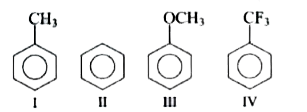The typical reaction of benzene and other aromatic compounds are electrophilic substitution. Presence of electron donating group activates the ring towards electrophilic substitution, while presence of electron withdrawing group deactivates the ring towards electrophilic substituion but at the same time activates the ring towards nucleophilic subsituion. Some groups are predominantly meta-directing and all of these are deactivating. Except halogen, most of the anddirecting groups are activating groups.
Which of the following compound is not formed.
_E01_248_Q01.png)
represents mixture of organic compounds. The mixture does not contain
_E01_248_O01.png)
_E01_248_O02.png)
_E01_248_O03.png)
all of them
The correct Answer is:B, C
Step by step video & image solution for The typical reaction of benzene and other aromatic compounds are electrophilic substitution. Presence of electron donating group activates the ring towards electrophilic substitution, while presence of electron withdrawing group deactivates the ring towards electrophilic substituion but at the same time activates the ring towards nucleophilic subsituion. Some groups are predominantly meta-directing and all of these are deactivating. Except halogen, most of the o-andp-directing groups are activating groups. Which of the following compound is not formed. X represents mixture of organic compounds. The mixture does not contain by Chemistry experts to help you in doubts & scoring excellent marks in Class 12 exams.
Updated on:21/07/2023Topper's Solved these Questions
- ALKENE, ALKANE & ALKYNE Book:ALLENChapter:ALKENE, ALKANE & ALKYNE Exercise:EXERCISE-4(A)
Explore 10 Videos
- ALKENE, ALKANE & ALKYNE Book:ALLENChapter:ALKENE, ALKANE & ALKYNE Exercise:EXERCISE-4(B)
Explore 10 Videos
- ALKENE, ALKANE & ALKYNE Book:ALLENChapter:ALKENE, ALKANE & ALKYNE Exercise:EXERCISE-2
Explore 103 Videos
- AIIMS 2019Book:ALLENChapter:AIIMS 2019Exercise:CHEMISTRY
Explore 40 Videos
- ALKYL AND ARYL HALIDEBook:ALLENChapter:ALKYL AND ARYL HALIDEExercise:EXERCISE-05 (B)
Explore 35 Videos
Similar Questions
The typical reaction of benzene and other aromatic compounds are electrophilic substitution. Presence of electron donating group activates the ring towards electrophilic substitution, while presence of electron withdrawing group deactivates the ring towards electrophilic substituion but at the same time activates the ring towards nucleophilic subsituion. Some groups are predominantly meta-directing and all of these are deactivating. Except halogen, most of the o−andp−directing groups are activating groups.
_E01_246_Q01.png) C2H5Cl.AlCl3−−−−−−−−→Δ(A) major.
C2H5Cl.AlCl3−−−−−−−−→Δ(A) major.
A is trisubstituted benzene. The structure of A is :
View SolutionThe typical reaction of benzene and other aromatic compounds are electrophilic substitution. Presence of electron donating group activates the ring towards electrophilic substitution, while presence of electron withdrawing group deactivates the ring towards electrophilic substituion but at the same time activates the ring towards nucleophilic subsituion. Some groups are predominantly meta-directing and all of these are deactivating. Except halogen, most of the o−andp−directing groups are activating groups.
_E01_246_Q01.png) C2H5Cl.AlCl3−−−−−−−−→Δ(A) major.
C2H5Cl.AlCl3−−−−−−−−→Δ(A) major.
A is trisubstituted benzene. The structure of A is :
View Solution
Knowledge Check
Towards electrophilic substitution, the most reactive will be
AnitrobenzeneBaninneCaniline hydrochlorideDN-acetylanilineThe correct order of reactivity towards electrophilic substitution is
Abenzene > phenol > benzoic acid > chlorobenzeneBphenol > benzene > chlorobenzene > benzoic acidCchlorobenzene > benzoic acid > phenol > benzeneDbenzoic acid > chlorobenzene > benzenegtphenol.Assertion : Aromatic aldehydes and ketones undergo electrophilic substitution reaction at metaposition.
Reason : Carbonyl group activates the ring towards electrophilic substitution reactions.AIf both assertion and reason are true and reason is the correct explanation of assertion.BIf both assertion and reason are true but reason is not the correct explanation of assertion.CIf assertion is true but reason is false.DIf both assertion and reason are false.
Give the increasing order of reactivity towards electrophilic substitution.
_CHE_E06_235_Q01.png)
View SolutionWhich of the following is the most reactive towards electrophilic substitution?
View SolutionWhich of the folliwng compounds is the most reactive towards electrophilic substitution reaction?
View Solution
Among the compounds the order of decreasing reactivity towards electrophilic substitution is
View SolutionAmong the compounds the order of decreasing reactivity towards electrophilic substitution is :

View Solution